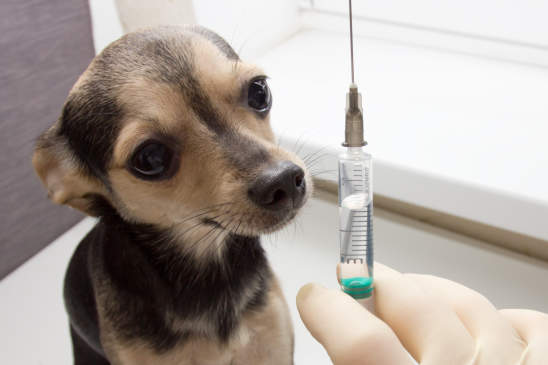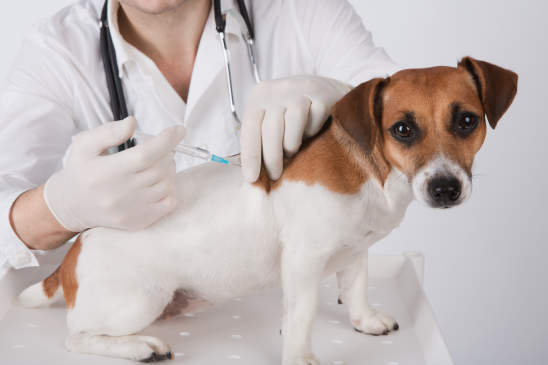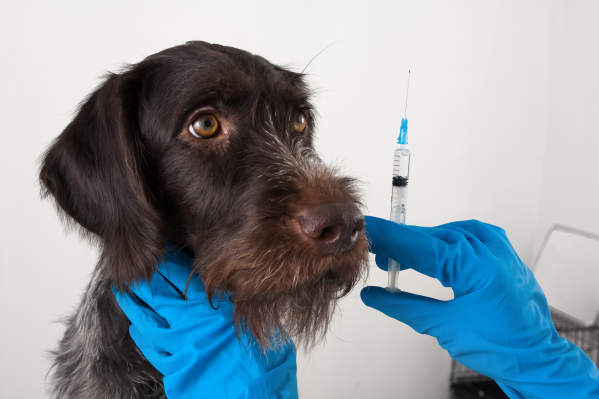Dogs get their noses into, well, everything. It’s how they take in the world, after all. But with all the snuffling around (and the licking), our pups get exposed to a swath of germs and viruses that can be harmful and sometimes even fatal. Vaccines, however, can protect your pet from many of these diseases; they’ve saved millions of pets’ lives over the last century, in fact.
Figuring out what vaccines to give your dog and when, however, can vary depending on where you live and your dog’s health and lifestyle. Read on to learn about how to determine what vaccines your pup should have, and how you can make the experience of receiving them as comfortable as possible.
What Vaccines Should My Dog Get, And When Should They Get Them?
No matter where you live in the United States, your veterinarian will recommend your dog or puppy receive certain core vaccines. “The two core vaccines for dogs are rabies and what’s called the Distemper vaccine, which is a group of vaccines that protects against not only Distemper, but also Parvovirus, Adenovirus, and sometimes Parainfluenza,” explains Deirdre Frey, a veterinarian who founded Vet At Your Door, a house call veterinary practice based in Maine.
If you have a puppy, the Distemper vaccine should be administered as early as 6 weeks old and is issued over two to three doses, two to four weeks apart. The Rabies vaccine should come a little bit later, at no earlier than 12 weeks of age, and a second dose is required a year later (and every year or three years after that, depending on the type given). Given that Rabies is universally fatal for dogs and can be transmitted to humans, the is also required by law in most of the United States.

Vaccinating your dog when they’re a puppy is important because their immune system isn’t fully developed yet, which makes them more vulnerable to contracting diseases. An adult dog should also receive vaccinations: either revaccinations (also called booster shots) if they were vaccinated when younger, or the first round of a vaccine if they were not. If you’re unsure of your dog’s vaccination history, make an appointment with your veterinarian to determine the best course of action.
Depending on where you live and your dog’s lifestyle, your veterinarian may recommend other vaccines for your pet as well. “Determining what other vaccines to get in addition to the two core ones depends on your geographical location and whether there is an increased incidence of a disease like Lyme in your area,” explains Dr. Frey. “The Bordetella vaccine, for example, which protects against kennel cough, is often recommended for dogs who go to doggie daycare or who are boarded regularly. Other vaccines like Lyme, Leptospirosis, and Influenza may be strongly recommended and even considered a core vaccine in certain areas, if there is a prevalence of the disease in that region.”
Every dog is unique though, so be sure to meet with your veterinarian to determine what’s right for your pet. If you want to go into that meeting with a starting point of what your pup may need, you can use this vaccine online calculator provided by the American Animal Hospital Association.
Are There Any Situations Where I Shouldn’t Get My Dog Vaccinated?
For most dogs, the side effects from getting a vaccine are short-lived and mild. There are certain conditions, however, where the potential risk of getting a vaccine should be balanced against the benefits.
“Vaccine administration is sometimes contraindicated in certain immune-mediated diseases,” explains Dr. Frey. “In that case, your veterinarian may perform blood titers to see if there is adequate protection from a previous vaccine. You and your veterinarian would weigh the benefits and risks of vaccination in those rare cases and come up with the best plan possible.”
Elderly dogs may also not be good candidates for vaccination. “When an animal is very old or sick, you and your veterinarian may decide it’s best to not vaccinate your pet so as not to stimulate an already compromised immune system,” says Dr. Frey. “It’s important to evaluate this decision with your veterinarian at the time the vaccine is due.”
How To Care For Your Pet During And After Receiving A Vaccine
“If you know your dog loves a certain treat, bring that with you to the veterinary office,” Dr. Frey suggests. “Give it to them while the veterinarian is giving the shot — that can sometimes distract them.”
And again, while the majority of dogs will have no or very mild symptoms from receiving a vaccine, there is a small chance they may have more serious side effects, such as vomiting, face and muzzle swelling, hives, or difficulty breathing. These symptoms will usually show up within the first 45 minutes after vaccination and should be treated by your veterinarian immediately.

But the most common reactions, if a dog has any reaction at all, are much milder. “Once your dog gets home, they may have a little bit of discomfort at the site of injection, just like us,” Dr. Frey says. “They also may seem a bit lethargic. They should rest that day and not do their normal running around. After about 24 hours of laying low, the symptoms will largely go away.”
And, of course, it’s important to keep your dog’s vaccinations up to date. “Different vaccines have different schedules,” Dr. Frey explains. “Once your dog is an adult, vaccines need to be repeated every one to three years, depending on the shot and your state’s regulations. Vaccines are labeled to last only a certain amount of time. After that time, it can’t be guaranteed that your pet will still be protected. This is why you need to be sure to stick to the vaccine schedule your veterinarian recommends.”
